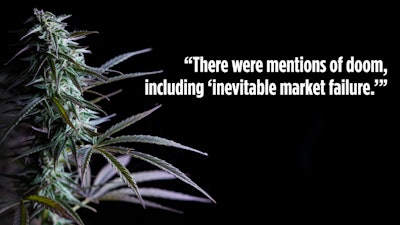
Each U.S. state has its own particular cannabis market trends to navigate—slumping sales, supply chain disruptions, license litigation and attendant cash flow fallout—but one thing remains true regardless of geography, according to a new report from Whitney Economics: “Worsening economics conditions are creating stress across the industry.”
This might sound familiar to anyone in the business.
The firm’s second annual Cannabis Operator Sentiment and Business Conditions survey report was published in late June, offering a glimpse into perceptions and realities in the industry as of Q4 2022. What we have in this report is an in-depth look at how plant-touching businesses are performing (not great!) and a bit of candid feedback on business owners’ projections for the future (not much better!). A passing reference to survey responses toward the end of the report might serve as a summary: “There were mentions of doom, including ‘inevitable market failure.’”
But while doom is present in these findings, it’s not all-encompassing. This report is, rather, a sober look at the macroeconomic trends with which any business owner (or even any homeowner) is familiar at this point. Inflation is omnipresent, which means that labor and input costs are dragging on the bottom line. Demand is simmering after ca.-2020 and -2021 highs, which means that sales are down (and prices remain as low as ever). Not much is coming up roses for cannabis business owners. The numbers make that clear.
Just 24.4% of respondents reported profitable operations as of Q4 2022. That compares alarmingly to Q4 2021 respondents’ reports that 42% of operations were profitable. (Note that Cannabis Business Times' own State of the Cultivation Industry Report, published in early June, found that 39% of cultivation businesses were profitable.)
And it’s not like the rest of the field is simply breaking even in Q4 2022 and into 2023: Almost twice as many—41.4% of the Whitney Economics respondents—reported that their businesses are losing money.
More to the point: Of those profitable businesses in late 2022, nearly all of them are retailers or product manufacturers. Cultivation businesses are having the toughest time in the industry right now.
Why is that? Whitney Economics lists several major obstacles before dipping into more specifical details:
- “The short-term national outlook for cannabis is poor”
- “Mature markets are losing the fight”
- “Brand-new state cannabis markets are facing an uphill battle.”
- “The illicit market remains the biggest competition.”
Read the full report here.
While Whitney Economics does not necessarily approach these business conditions in a prescriptive way, the authors do point to certain pressure-release valves in the market that might help.
“The data from this survey shows that the industry is at yet another inflection point, which requires policy makers to shift their focus away from capturing consumer demand, with a focus on tax revenues and instead, focus more on creating policies that support business,” according to the team. “What the data is saying is that, at some point, regulators have to choose to protect the businesses that make up the industry. They need to nurture businesses and business development rather than deploying policies that end up driving demand away. This may entail less regulatory control, as it is those regulations that are suppressing the opportunities for growth.”
The report breaks up that data into specific reports on businesses’ bottom lines and input costs (as well as future bottom line expectations and input cost expectations), and each of those broader categories comes with more focused reports on different aspects of plant-touching business plans and budgets: sales, profit margins, price points, costs, wages, capital spends, as well as skilled and unskilled labor, raw materials and intermediary materials.
Cannabis Business Times has reported extensively on the ongoing price compression issue, as well as the out-of-sync supply and demand curves in most U.S. cannabis markets. Whitney Economics’ survey report confirms what most operators have been seeing: Sales are down (in most cases), and prices are down (in nearly all cases), which means that profit margins are in a very tough spot.
“Under normal business operations, excess inventories lead to price reductions,” according to the report. “Business operators try to clear their excess inventory by stimulating demand with lower prices. This was a strategy used by some cannabis retailers. At the same time, suppliers who had excess inventories had to take a similar approach. These approaches have led to a race to the bottom of pricing. With consumers spending less and suppliers forced to decrease prices, the overall industry has suffered both revenue and margin losses.”
For anyone looking for a bright spot on the horizon, keep looking. Whitney Economics forecasts that demand will lay low for the next 18 months—at least.
“The future is not brighter yet, so operators need to look to their own operations to get lean. Efficient operations now will be the survivors later, when demand accelerates, which we forecast to occur in 2025.”
The report leaves readers with direct quotes from survey respondents, including one appendix addressing the question, “Where Will We Be in a Year?” Here are a few of these speculative but insightful answers:
- “I think that the chances of it going recreational will go up next year. I see the industry just expanding more.”
- “Without removal of the current banking restrictions, one year from now (December 2023) we will see much of what we see now, the slow death of an industry that offers much benefit to the overall economy.”
- “I'm not sure and it won't matter to me. Lucky to be out of industry.”
- “Pretty much the same place except quality will continue to degrade due to mass production and greed.”
- “Hopefully it will recover and the small guys will not lose EVERYTHING!!!!!!!!!”
- “I'm not sure where we are going. It is very difficult to plan long term, with the current state of affairs.”
- “I think in a year we will still be trying to legalize the industry. I've been working in this industry for 9 years and I'm still surprised that we are still at this point.”
- “I unfortunately see the Oregon market being taken over by large MSOs.”
- “Growing still. The downturn in the economy will be something difficult to predict and how it will impact the market. If customers become more price conscious, will they choose to purchase illegal products or cutback on consumption? That is a big question for an industry that hasn't faced too many down cycles of the economy.”
- “Big Pharma will take it all over.”
- “Numerous craft farmers going out of business.”
- “Worse.”


























